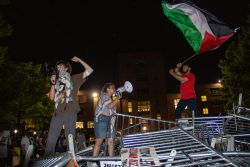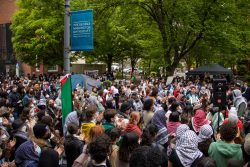Although it never reached the point of physical violence, tension ran high in Copley Formal Lounge during a forum yesterday about the cartoons published by the Danish newspaper Jyllands-Posten last year.
The discussion featured Flemming Rose, cultural editor of the Posten, and Aiman Mazyek, General Secretary of the German Central Council of Muslims.
Rose cited several instances of self-censorship in Danish culture towards Islam as the impetus for commissioning the cartoons. Rose was quick to mention that they were not meant to simply goad Danish Muslims, and that the Posten has ridiculed many religious and political groups in addition to Islam.
“The cartoons did not in any way transgress the norms of Danish society,” he said. “We have in fact printed many, many cartoons making fun of Jesus and Christianity, and the Jews.”
He proudly included Hindus and Jehovah’s Witnesses as well.
Rose said that the idea for the Mohammad cartoons originated when an author of children’s books was having difficulty finding an illustrator willing to draw the Muslim prophet, and the final illustrator refused to have his name published for fear of reprisals. He also cited an instance where a teacher was attacked for reading the Qur’an aloud as a non-Muslim and pieces of art that could be offensive to Muslims were removed from museums in London and Sweden.
“That was the reason why, in the beginning, I commissioned these cartoons,” he said.
In contrast, Mazyek focused on the rights of Muslims to be respected as on par with the right of freedom of the press.
“Does freedom of expression give people the right to blaspheme and carve prejudices in stone?” he asked. He added that parties on both sides have unnecessarily polarized the issue, sarcastically commenting that, “they have at last found conclusive evidence of what they have suspected all along: a clash of cultures.”
He countered that both sides could find common ground, and that respect and tolerance are Western values as much as freedom of the press is.
“It’s really not about censorship,” he said. “It’s about respecting the holy and the sacred.”
The last 40 minutes of the presentation were dedicated to questions from the audience, who maintained the charged atmosphere in the room. The eclectic audience included a Muslim student journalist, a student wearing a Danish flag patch and a Holocaust survivor who drew parallels between Holocaust denial in Egyptian newspapers and the Danish cartoons. Some comments drew sputtering applause from individual audience members, particularly when Mazyek declared that Holocaust denial was an offense on par with the cartoons.
Sympathies appeared to closely follow ethnic lines: no questions asked by white audience members were critical of Rose and all questions asked by non-white audience members were critical of his decision
Farah El-Sharif (SFS ‘09), a member of the Muslim Students Association who attended the event, which was jointly sponsored by the BMW Center for German and European Studies and the Berkeley Center for Religion, Peace and World Affairs, was disappointed with Rose’s explanation of his decision.
“He who publishes with such ill-intent must be just as worthy of being deemed just as ‘violent’ as the audience who has received it,” she wrote in an e-mail.




